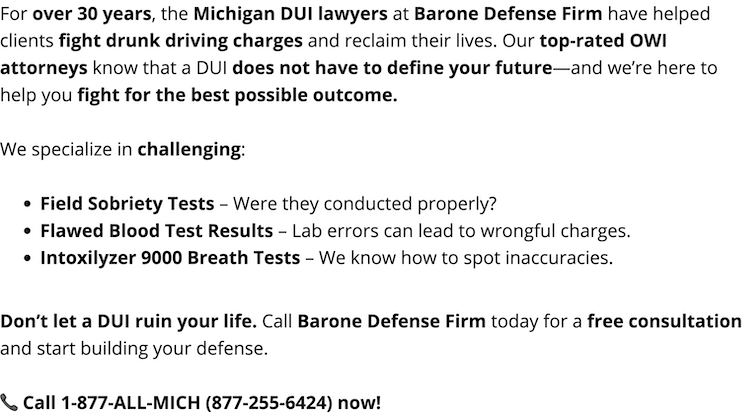Michigan DUI Case Process
 If you are facing a drunk driving charge or any version of the crime of operating while intoxicated, including drugged driving, you can expect the following steps as your case moves through the system.
If you are facing a drunk driving charge or any version of the crime of operating while intoxicated, including drugged driving, you can expect the following steps as your case moves through the system.
These stages often required by either the United States Constitution, Michigan's Constitution, along with those imposed by various statutes and court rules.
The general purpose of these rules is to ensure fairness to the accused while protecting society for a potentially dangerous person while their case is being decided by a judge or jury.
After you are arrested and taken to the police station, you will be processed. This often includes fingerprints, a photograph, and a chemical test, such as a breath or blood test. This is when the police report will be prepared.
You will probably need to stay there overnight, but once you've sobered up, you will be released, and will wait for the court process to begin.
ArraignmentA criminal case will usually start with an arraignment. This first step in the DUI case process will occur before either a judge or magistrate.
In some courts, depending on the exact charges, the arraignment might be combined with a pre trial (see below). The arraignment is designed to accomplish two things. The first is for the court to advise you of the nature of the charges against you as well as the applicable punishments.
The second part is the scheduling of bond. Your attorney will usually “waive the formal reading” in which case the court will assume you already understand the charges and penalty.
Often your lawyer will also tell the court that for purposes of arraignment you are “standing mute.” Thereafter the court will enter a plea of not guilty on your behalf. The court will then move on to address the issue of bond.
Court Rule on Bond ConditionsThere are two parts to any bond. The first part is the determination of what amount of money is necessary for you to post to assure that you will appear in the future. This can be anywhere from personal recognizance and where no money is due, to $100,000.00 or more. Most first offense DUI cases will have a low bond or a personal bond.
The second part of the bond hearing at the arraignment will consist of the court determining what conditions are necessary to keep the community safe and will you are free to move about within the community.
In the context of a DUI case, that usually consists of your being ordered to not use alcohol or any kind of illegal drugs, often including marijuana, some type of alcohol and/or drug treatment, and possibly also, participation in therapy of support group meetings.
Bond Violation Show Cause HearingIf the court believes you have violated a condition of your bond, your case will be set for a bond violation show cause hearing. At this hearing you must provide evidence, or show cause, as to why the court is wrong. A typical bond violation hearing occurs when you test positive for drugs or alcohol while on bond.
If the court finds that you have violated your conditions of bond you risk having your bond “cancelled” in which case you would remain behind bars during the time your DUI case is pending with the court.
Pretrial ConferenceAfter the arraignment the case will be set for a pretrial. A pretrial is just that, a hearing that takes place before a trial. The purpose of a pretrial is for the court to learn whether the case can be resolved without a trial.
The pretrial also provides the prosecutor and defense with a scheduling order providing deadlines as to when discovery must be provided, motions filed etc. The Judge will often also include a trial date and a plea cut-off date.
After the first pretrial one of four things will happen: (1) a new date for pretrial will be provided, usually because discovery is ongoing and incomplete, (2) a motion or evidentiary hearing will be set, (3) a plea will be entered, or; (4) the case will be set or proceed to trial.
Thus, a first pretrial is usually succeeded by the scheduling of another court date for one of these four options. However, the pretrial is the first opportunity you will have to plead guilty if that is your choice.
DUI MotionsIf your lawyer thinks that the court needs to provide guidance on a legal issue, a motion will be filed. A motion is a written legal argument asking for the court to do something, such as dismiss a case or suppress evidence.
Motions are appropriate where there is an unlawful stop or arrest, or when the charge is not supported by the evidence, or that some of the evidence that supports the charge is not admissible, then they may file a written legal argument called a motion.
In this case your lawyer would write out his/her reasoning in support of this contention, cite any applicable case law, and ask the judge to dismiss your case. The prosecutor will respond, the judge will review both arguments, and make a ruling.
DUI Evidentiary HearingsVery often a legal motion will require the court to review the facts of the case and apply these facts to the law cited by the parties. In those instances where facts are disputed or the investigation is incomplete, the court may wish to hear testimony from one or more witnesses. In such instances, the case will be set for what is called an evidentiary hearing.
Because witnesses are called and cross-examined, these hearings might look very much like trials, but they are quite different.
The burden of proof is less, and with an evidentiary hearing the court is usually looking at one narrow issue. The result is a legal ruling bearing on the case, the result is not a finding of guilt or acquittal.
The DUI TrialMost DUI cases are resolved through plea negotiations. However, if you are unable to resolve your case this way then you may wish to set your case for trial. The purpose of a trial is to allow the jury to decide issues of fact. Issues of law or reserved for the judge.
The trial begins with jury selection. After the jury is impaneled, the prosecuting attorney will make an opening statement. The defense can also make an opening statement but is not required to do so. The reason the defense can waive its opening statement is because the defense does not have a burden of proof.
After the opening statement, the prosecutor will call witnesses. When the prosecutor is done calling witnesses the prosecution will rest. At this point the defense can call witnesses as well. But again, there is no obligation to call witnesses because the prosecutor has the burden of proof. After the case is completed, the parties will give their closing arguments.
Then the case goes to the jury for decision. If you are acquitted, meaning found not guilty, your case will be dismissed as if it never happened. On the other hand, if the jury convicts you then he will be sentenced. Most DUI cases not involving injury or death will take between one and three days to try.
OWI Case LengthEvery case and court are different, but as a general rule, most DUI cases take between four to six months to fully resolve; however, every case is unique, and the details and procedures of your case will determine how long it takes to reach its conclusion.
If your case is set for trial, this can significantly lengthen the amount of time your case takes to reach its conclusion. And if appeals are involved, your case can sometimes take years to fully resolve.
During each of the DUI case process set forth above, there are many opportunities for your defense lawyer to negotiate a favorable outcome. If you are facing a DUI charge, have the Michigan DUI Lawyers at the Barone Defense Firm provide you with a free no obligation case review.
 Barone Defense Firm Home
Barone Defense Firm Home




















